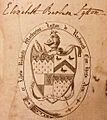Richard Warburton Lytton facts for kids
Richard John Warburton Lytton (born Richard Warburton; August 26, 1745 – December 29, 1810) was an English landowner. He was part of the important Lytton family. He was the father of Elizabeth Barbara Lytton and the grandfather of two well-known figures: Henry Bulwer, 1st Baron Dalling and Bulwer and Edward Bulwer-Lytton, 1st Baron Lytton.
Contents
Early Life and Education
Richard Warburton was born in 1745 to William Warburton and Barbara Lytton. His family lived in Yarrow, which is in Queen's County, Ireland. He was baptized on September 5, 1745, at St Anne's Church, Soho in London.
Richard went to Harrow School, a famous school at the time. There, he studied under Robert Carey Sumner. He also met some interesting people who would become famous, like Sir William Jones, Samuel Parr, and William Bennet.
Becoming Richard Lytton
In 1762, Richard inherited Knebworth House from his uncle, John Robinson-Lytton. This was a very important estate. Because of this inheritance, Richard added "Lytton" to his name. This meant he was now known as Richard Warburton Lytton.
There was a legal case in 1793 about the inheritance. It was decided that Richard could fully own Knebworth House and its park only after his uncle's widow, Leonora Lytton, passed away in 1790.
Richard, still known as Richard Warburton at the time, went to University College, Oxford. He did not go to Christ Church, Oxford, as some stories later suggested. At Oxford, he met Richard Paul Jodrell, whose younger sister he would later marry.
Important Connections
Richard Lytton was elected to the Royal Society in 1772. This was a big honor, as the Royal Society is a group for important scientists and thinkers.
In 1774, he wrote a letter to his friend Samuel Parr. In the letter, he mentioned that he was helping Thomas Halsey get elected as a Member of Parliament for Hertfordshire.
Lytton also attended a special Greek play in 1775 or 1776. This play was put on by Samuel Parr's students in Stanmore. It was quite new and exciting for the time.
Friends and Activists
Richard Lytton kept a journal, which tells us about his friends in the 1780s. He spent time with Granville Sharp and Andrew Kippis. He was also university friends with Thomas Day, who was a strong supporter of ending slavery.
Later Life and Travels
After the French Revolution began, Richard Lytton traveled to France. He owned an estate in Boulogne. While there, he met and talked with many French thinkers.
However, he had to leave France quickly when war broke out. His house in France was taken by the government. When he returned to England, he helped French people who had to leave their home country. One of these people was Abbé Béliard, who became a teacher at a school in Enfield. Richard Lytton had been introduced to the school's owner, John Clarke, by Joseph Priestley.
John Clarke's son, Charles Cowden Clarke, wrote about visiting Richard Lytton when he lived in Enfield. Later, Richard Lytton moved to Ramsgate.
Richard Lytton passed away on December 29, 1810. He was buried on January 5, 1811. There is a special stone in his memory in the south side of St Laurence, Ramsgate church.
Family Life
Richard Lytton married Elizabeth Jodrell in 1768. Elizabeth was the daughter of Paul Jodrell, who was a Member of Parliament. Elizabeth lived longer than Richard, passing away on November 1, 1818.
Richard and Elizabeth separated after about three years of marriage. They had one child together. Elizabeth moved to London, while Richard lived in different places outside of the city. He did not live at Knebworth House, even though he had inherited much of the estate at age 21 in 1766. The main house remained with his aunt, Leonora, until her death.
Their daughter, Elizabeth, married William Earle Bulwer. They became the parents of Henry Bulwer, 1st Baron Dalling and Bulwer and Edward Bulwer-Lytton, 1st Baron Lytton.
Images for kids
 | DeHart Hubbard |
 | Wilma Rudolph |
 | Jesse Owens |
 | Jackie Joyner-Kersee |
 | Major Taylor |


